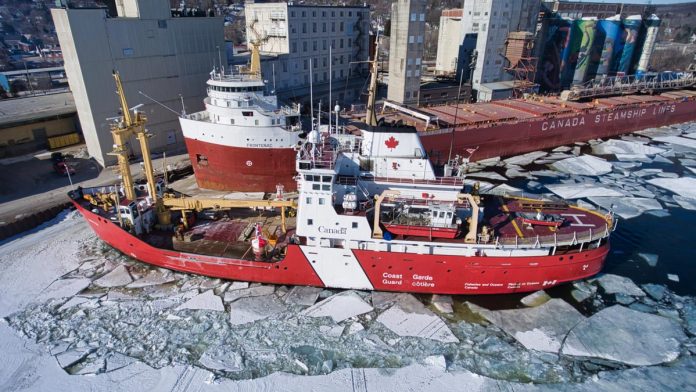KAGAWONG – Colen McKeever wants people to know there is a solution for small communities in Northern Ontario wanting to reduce their carbon footprint and see a healthy return on investment. His company, CDM Agency, is the Northern Ontario agent for Eco-Growth Environmental Inc. based in Calgary. Eco-Growth uses a proprietary technology to reduce food and yard waste into a pathogen free biofuel material that is introduced into a biofuel boiler system, producing hot water that can be used for building heat or in industrial hot water processes.
Food waste costs the Canadian economy more than $49 billion each year, according to a 2019 report. This means that 58 percent of the food produced in Canada, or 36.5 million tonnes, is lost or wasted each year. The average Canadian household spends $1,766 on food that is wasted every year. Zero Waste Canada reports that most households waste an entire bag of groceries worth of food for every five purchased. That’s a lot of food waste. Most of it ends up in our landfills, creating about 45.5 million tonnes of carbon dioxide equivalent emissions. When they decompose in a landfill, organics produce methane gas which is 25 times more damaging to the environment than carbon dioxide.
Much of the food wasted, about 32 percent or more than 11 million tonnes, could be redistributed through food banks or other organizations across Canada to support people in need. Food waste can be composted and turn into high quality soil nutrients for farmers or home gardeners. Another option is to break food waste down in an anaerobic digester where methane can be captured to produce renewable natural gas.
Eco-Growth also looks at food (and yard) waste as a source of clean energy. They’re actually a laundry company with a 60,000-square foot facility. They were looking for alternative ways to use their waste stream and turn it into an energy source. Eco-Growth used to heat 13,000 gallons of water every day using natural gas but now divert their waste and turn that into a carbon neutral fuel source.
In a pilot project they undertook with the town of Cochrane, Alberta, Eco-Growth found that almost 70 percent of what went into municipal dumpsters was waste paper towels. Now Eco-Growth sells Cochrane $3,000 of paper towels and consumables a year and the town saves about $3,600 in tipping fees while also reducing their carbon footprint. Eco-Growth diverts the paper waste to their facility where it is processed and heats their hot water.
A full circle economy is the way to go, said Mr. McKeever. Smaller Eco-Growth systems can handle 100 pounds per day up to 600 pounds per day and come complete with biofuel boiler and can be sized for small communities up to 20,000 people. The Eco-Growth Organic Recycler, called EGOR, takes organics such as wet food waste, wet papers, fish, meat—anything that is organic—and then dehydrates it to remove the moisture. “What is leftover is a dry biomass substance that can be used as a biofuel in our specially designed gasifier boiler or it can be used as a soil additive,” he said. “The gasifier heats the organic matter to 1,700 or 1,800 degrees, essentially creating a sterile product. The methane and carbon dioxide gases that are released are burned inside the boiler and it is only water vapour that comes out of the stack, so it is a very environmentally friendly process.”
The systems are currently being used in waste treatment facilities, breweries, permaculture and hydroponics, Mr. McKeever said. “In hydroponics, they take the heat and water the process generates as well as the vapour that comes out of the burning process and they’re feeding it back in and having very good luck growing leafy greens like kale and basil and lettuce. Their goal with this project is to get it into Northern communities to provide them with fresh food and heating.” Eco-Growth systems are also installed in four federal buildings in Ottawa and the company is working with Loblaw’s corporate office to pilot a project for grocery stores.
“Another pilot project, with ConocoPhillips at their 700-man camp, led to ConocoPhillips actually investing in Eco-Growth,” Mr. McKeever said. “Their situation is not unlike Manitoulin Island—they are 80 or 90 miles away from the nearest landfill and were having to truck all of their garbage and biomass to Fort McMurray. They wanted to reduce their carbon footprint and called Eco-Growth. They’re now processing the biomass on site, using the biomass in their systems and have eliminated the trucking costs. They’ve reduced their carbon footprint while creating a product that can be used in their facilities.”
Mr. McKeever wants to see a circular economy that doesn’t cost the end user. He began his career in the mechanical field over 50 years ago. Although most of his early career involved specialized projects, he has been applying his technical expertise to a variety of sales and special project settings for the past two decades. The McKeever family relocated to Manitoulin in 1997 and resided at the Carter House in Kagawong until recently.
“I am now in semi-retirement and have found myself with a bit more time on my hands to pursue areas that are of greater importance to me,” he said. “One area that I have found myself feeling particularly passionate about is the reduction of the carbon footprint, particularly here on Manitoulin. More specifically, I have observed that most Canadian communities and businesses are struggling with the issue of waste management. I am hoping that I can assist, on a smaller level, communities and businesses in my own neighborhood develop solutions, tailored to their individual needs, to reduce their carbon footprint and make Manitoulin an even greater place to live.”
“I work with each client individually,” he explained. “We identify the current costs of dealing with their waste and identify their needs and goals. I look at this as a solution to waste and reducing your carbon footprint but it’s very important to look at the return on investment and the carbon credits that are available.” There are turnkey systems available where everything is shipped as a functional unit in a container or the client could provide the building. Every system is a custom solution, he said.
The system could work in a central, consolidated facility on the Island or could be utilized by individual municipalities, said Mr. McKeever. “It’s also ideal for hospitals, retirement homes, schools and restaurants.” He has approached some municipalities and hospitals but funding issues and COVID-19 protocols means these are basic introductions only to date.
“This is a full circle solution to organic waste management in industrial, commercial, institutional or municipal applications that would generate a return on investment and reduce the carbon footprint on Manitoulin Island,” said Mr. McKeever.
Contact CDM Agency by email at colen@rogers.com.





